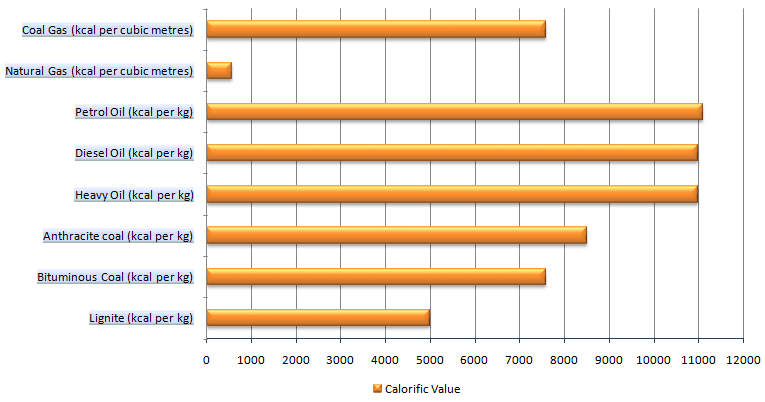In power generation the calorific value of fuel is prime factor. Use of fuels having high heat of combustion gives best output in terms of cost of electricity or energy generated. When we generate electricity in steam power plant we have to burn fuel like coal, petroleum oil or flammable gases.
In thermal powers generation fuel like coal, gas, oil or domestic waste serves as raw materials for producing electricity. Best quality fuel shall have best calorific value that means by burning less amount we can get much energy in terms of heat and then drive the turbines through steam or flu gases etc.
What is calorific value of a fuel
It is defined as “the total amount of heat liberated, when a unit mass of fuel is burnt completely”. The calorific value determines the efficiency of a fuel. There are many units to measure the amount of heat or heat of combustion of a fuel like calorie, kilocalorie, British Thermal Unit (B.T.U), Centigrade Heat Unit (C.H.U). Calorimeter is the instrument that is used for the measurement of calorific value or heat of combustion of fuels.
With fuels containing hydrogen, two calorific values are distinguished, higher or Gross Calorific Value and lower Or Net Calorific Value.
Higher or Gross Calorific Value of Fuels
It is the total amount of heat when a unit mass of fuel is burnt completely. The gross calorific value includes the latent heat of condensation of steam, because steam is produced during the burning process and when it is cooled to room temperature it becomes condensed.
Lower or Net Calorific Value of Fuels
It is net heat produced when a unit quantity of the fuel is completely burnt. In calculating the NCV he bi-products of the combustion are allowed to escape. Under normal working conditions, water vapours produced during combustion are not condensed and escape as such along with the hot gases. Since lesser amount of heat is available, therefore this is called Lower or net calorific value of fuels.
Formula for Calorific Value of Fuels
Calculation of Net calorific value
Net calorific value =gross calorific value – latent heat of water vapours
Net calorific value (NCV) =Gcv – weight of hydrogen x 9 x latent heat of water vapours
Latent heat of water vapours is 587 kcal/kg
Hydrogen in the fuel reacts with oxygen to give water
H2 + 1/2 O2 → H2O
2H = 1/2O2 = H2O
2parts = 16parts = 18parts
1parts = 8parts = 9parts
Thus,
NCV=GCV-0.09H*587 where
H-% of Hydrogen in the Fuel
Theoretical Calculation Of Calorific Value – Dulong’s Formula
If both hydrogen and oxygen are present, it may be assumed that all the oxygen are already combined with 1/8 of its weight of hydrogen to form water. This fraction is then deducted from the hydrogen content of the fuel in the calculation. Thus for a fuel containing carbon, hydrogen, oxygen and sulphur, the calorific value of the fuel is given by Dulong’s Formula as below:
Calorific value =1/100[8080 C + 34500 {H − O/8 } +2240 S] kcal/kg
where C, H, O, S refer to % of carbon, hydrogen, oxygen and sulphur respectively.
Finally we can define the calorific value of a fuel as the amount of heat produced by complete combustion of one unit of the fuel. The unit we consider can be in terms of weight or volume depending on the type of the fuel. Like for coal we use weight unit i.e. in grams and in case of liquid and gaseous fuel, we can use volume unit for the purpose.
Therefore calorific value of coal can be amount of combustion heat in calories generated in the combustion of one gram of coal. So the unit of measure is calories per gram or kcal/g. On the other hand the calorific value of diesel or calorific value of petrol can be expressed in calories per liter or kilo calorie per liter kcal/ltr.
Calorific Value of Fuel
Let us look at calorific value of some well known fuels.
- Lignite has a calorific value of 5000 kcal per kg.
- Bituminous coal has a calorific value of 7600 kcal per kg.
- Anthracite coal has a calorific value of 8500 kcal per kg.
- Heavy oil has a calorific value of 11,000 kcal per kg.
- calorific value of Diesel = 11,000 kcal per kg.
- calorific value Petrol = 11,110 kcal per kg.
- calorific value of Natural gas = 560 kcal per cubic meters.
- Coal gas has a calorific value of 7600 kcal per cubic meters.

Calorific value of fuels diesel petrol and gas
Discover more from Electrical Engineering 123
Subscribe to get the latest posts sent to your email.

